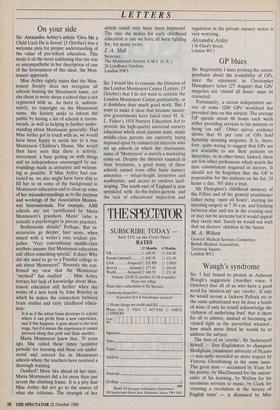LETTERS On your side
Sir: Alexandra Artley's article 'Give Me a Child Until He is Seven' (1 October) was a welcome plea for proper understanding of the value of pre-school education. This made it all the more saddening that she was so unsympathetic in her description of one of the forerunners of this ideal, the Mon- tessori approach.
Miss Artley rightly states that the Mon- tessori Society does not recognise all schools bearing the Montessori name, yet she chose to write about a school that is not registered with us. As there is, unfortu- nately, no copyright on the Montessori name, the Society seeks to inform the public by having a list of schools it recom- mends, as well as helping to further under- standing about Montessori generally. Had Miss Artley got in touch with us, we would have been happy to invite her to a true Montessori Children's House. She would then have seen that there is activity, movement, a busy getting on with things and an independence encouraged by sur- roundings made as attractive and welcom- ing as possible. If Miss Artley had con- tacted us, we also might have been able to fill her in on some of the background to Montessori educatidn and to clear up some of her misunderstandings as to the purpose and workings of the Association Montes- sori Internationale. For example, AMI schools are not 'certificated by Maria Montessori's grandson, Mario' (who is actually a psychologist in private practice).
Bothersome details? Perhaps. But in- accuracies go deeper, hurt more, when mixed with a writer's own evident pre- judice. 'Very conventional middle-class mothers assume that Montessori education still offers something special.' It does! Why did she need to go to a Froebel college to ask about Montessori? 'Recently she con- firmed my view that the Montessori "method" has ossified ...'. Miss Artley betrays her lack of knowledge about Mon- tessori education still further when she writes of a new book by John Brierley in which he makes the connection between brain studies and early childhood educa- tion: It is as if the infant brain develops to a point where it can profit from a new experience, and if this happens, it goes ahead to the next stage, but if it misses the experience it cannot proceed along that path and finds another. Maria Montessori knew that, 70 years ago. She called those times 'sensitive periods' for learning and these are under- stood and catered for in Montessori schools where the teachers have received a thorough training.
Ossified? More like ahead of her time. Maria Montessori did a lot more than just invent the climbing frame. It is a pity that Miss Artley did not go to the source of what she criticises. The strength of her article could only have been improved. The case she makes for early childhood education is one we have all been fighting for, for many years.
J. A. Hall
Secretary, The Montessori Society A.M.I. (U.K.), 26 Lyndhurst Gardens, London NW3


































































 Previous page
Previous page